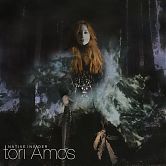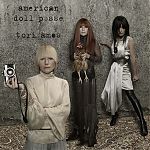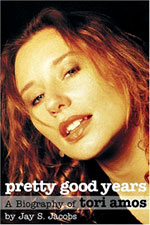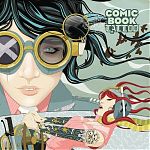- Articles
- Cherries
- Minutiae
- Q&A
- RAINN
- Releases
- Reviews
- Site News
- Them
- Toriphiles
- Touring
- TV/Radio/Web
- Video
News Archives
Keep an eye on our Twitter and Facebook pages since we often post quickie updates there when we're on-the-go.
During tours, we do our best to cover setlists in real-time on Twitter. If you want to tweet a show in, just DM or @ us on the day and tell us to watch your stream that night.
Tori is touring in 2017 to support the release of Native Invader. The European legs runs from early September through early October and the North American leg runs from late October to early December. We do not know if additional dates elsewhere will be added.

Native Invader (album, 2017)

Unrepentant Geraldines (album, 2014)

Gold Dust (album, 2012)

Night of Hunters (album, 2011)

Midwinter Graces (album, 2009)
 Abnormally Attracted To Sin (album, 2009)
Abnormally Attracted To Sin (album, 2009)
Live at Montreux 1991/1992 (DVD, 2008)

American Doll Posse (album, 2007)

A Piano (boxed set, 2006)

Pretty Good Years
(bio, 2006)

Fade To Red
(DVD, 2006)
 Comic Book Tattoo (book, 2008)
Comic Book Tattoo (book, 2008)News: Spinner Interview (October 29, 2007)
I mean, [Tash has] asked me, “What’s a lesbian? What’s a gay guy?” And I’ll explain, “Well, it’s when a woman marries a woman, or when a man marries a man.” We use the word “marry” because she understands that. And the trick here is finding the word association that brings a picture to her mind so that she can understand. Sometimes you can use all kinds of jargon and it doesn’t mean anything to her. She just turned seven, so the physicality of what’s involved is … well, she can watch movies where people kiss and she kind of tilts her head and looks at it. I think she can feel things within herself as most children do, but that doesn’t mean that in any way you’re ready to have a sexual conversation.
Leah tipped us off to this Tori interview from AOL’s Spinner magazine. This one’s lengthy and full of interesting insights about Tori’s relationship to her parents and to Tash, so make a cup of tea and give yourself time to read it.
Tori Amos Talks Lesbians, Love and Lucifer
Posted Oct 29th 2007 12:00PM by Jessica Robertson
When Tori Amos opens her dressing room door, just inside a narrow, fluorescent-lit hallway within the backstage maze of Madison Square Garden, it’s not her signature ginger mane that first appears. Rather, two snowy-haired individuals, each dressed for the sudden New York City chill, emerge. “I want you to meet my parents,” Amos, stepping from behind her mother, Mary Ellen, says. Her father, the Rev. Dr. Edison Amos, steps forward with his wife, who has already begun her greetings.
“I’m Tori’s mother,” she says, beaming, her eyes as wide as they are blue. She acknowledges each person standing before her while extending her hand in a warm, gentle shake. Dr. Amos, his neck wrapped in a scarf and his coif slightly masked beneath a baseball cap, does the same. Tori stands in the doorway, a snapshot of Mrs. Amos thirty years younger, looking on and offering introductions as they are needed.
“Dad, do you want me to keep your coats back here during the show?” she interjects. Her parents glance at the layers draped over Dr. Amos’ right arm. It’s just under two hours before Tori is due onstage for the second of her New York shows on the ‘American Doll Posse’ tour. Her father cedes the coats, as Mrs. Amos shuffles toward me. She grasps my hand, cupping it with each of hers. “You feel cold,” she says, still grinning. “Did you forget your coat?”
Dr. and Mrs. Amos linger only shortly thereafter, departing with a wealth of hearty goodbyes. “Come in,” Amos says, pushing the door wide. The room is dressed in a creamy peach tint, with modest decor: a vanity and accompanying closet at the far end, two sofa chairs, one couch/bed hybrid and a sizable electronic keyboard, which sits in front of a small end table that hosts three candles and a diminutive red lamp. She plops down in one of the chairs, crossing her left leg over her right and resting her arms on each side. Her warmth and passion are palpable, her smile contagious. Amos inhales, letting her breath go quickly. “How are you?” she asks. “You changed your hair.” Amos is as sharp in memory as she is in wit. It signals the beginning of a conversation that had every intention of being mapped, but like most with Amos, detoured into a world of color and revelation. “Let’s just talk,” she says. So it ends, so it begins.
By the time the ‘American Doll Posse’ world tour concludes in December, you will have performed your 1,000th proper show since your first world tour in 1992. You’ve never been one to cancel a show. In fact, have you ever canceled?
That’s a really good question. Years ago I think I canceled in Poughkeepsie, in 1998. I don’t cancel, and that’s why I can remember the one show that I did after all of these years. A couple of shows were canceled because of flooding. For instance, a gig itself had a sprinkler system that went wrong in Texas maybe in ’94 or ’96. I think it was Fort Worth. But we didn’t cancel. I try and never cancel because people have changed their lives to be there.
It’s interesting to see the audiences’ reaction to each of the dolls — Pip, Clyde, Isabel and Santa — that are opening the individual shows. Lesbians seem to respond to Pip, who opened the first of your two New York City gigs.
The thing that I’ve been learning about Pip — through live performance mainly — is that she is usually tackling an issue every time she plays. Something’s happened in the world and the performance is really built around her response. Now, the audience might not know what it is that Pip is responding to, but you can feel it. I felt Pip as very confrontational that night — very angry. She was commenting on a sexuality that is so gruesome which is the fact that it’s come to light in the U.S. that so many small children are being used as sex slaves at four years old. And specifically the story about that FBI agent who came over with a toy for this child and some vaseline. And that was just Pip’s response. I think that because she holds Athena, because it’s about the warrior, she’s always looking at issues. They’re not always political — that’s more like Isabel — but looking at where power is abused. And maybe lesbians have an instinct. They are hyper aware of male authority that is not only out of line, but that denigrates women and rips the soul out of children. I think that’s why lesbians might respond to her.
At the same show, you sang an improv about flying with your daughter, only to look over and find her, as you said it, “playing with her privates.” Has she started to ask you sexual questions?
It’s tricky sometimes. I mean, she’s asked me, “What’s a lesbian? What’s a gay guy?” And I’ll explain, “Well, it’s when a woman marries a woman, or when a man marries a man.” We use the word “marry” because she understands that. And the trick here is finding the word association that brings a picture to her mind so that she can understand. Sometimes you can use all kinds of jargon and it doesn’t mean anything to her. She just turned seven, so the physicality of what’s involved is … well, she can watch movies where people kiss and she kind of tilts her head and looks at it. I think she can feel things within herself as most children do, but that doesn’t mean that in any way you’re ready to have a sexual conversation. She has feelings and she’s aware. But I try and be protective of her. There’s an innocence. Certain concepts about sexuality, she’s just not ready for. Because she’s on tour and there are a lot of women on tour, she wants to know what the big band aids are for and the funny things that are rolled up and look like a cotton ball. We talk about these things so she understands. She’s asked me, “Where do babies come from?” We talk about it — there are two ways. And there are some things she does know. She understands it takes a joining to make a child but she understands that you can be married — you can be a woman married to a woman — but you need a man to make a child. Even though they might not love eachother. We have a lot of gay people that come in and out of our life that are working and some are traveling with us. There’s a gay couple, and Tash has heard that they might want children. And she’s wondering, “Well, who’s gonna carry the baby then?” So we talk about it. That’s a choice that has to be made.
Do you remember going to your mother with those same questions?
My mom is the most … I almost want to lend Britney Spears my mother. Not that I think that woman isn’t a good woman. My mother is almost eighty and has never been in the business. And one reason I have been able to sustain is because of my mother. And if I didn’t have my mother, who you just met, I would have no idea … I can’t look in your eyes and tell you I’d be sitting here. I honestly don’t think I would be. So I’m very fortunate because she’s so loving. However, she’s a Christian woman and there’s some things that she wouldn’t talk about. So, I learned in other ways: friends, books — we didn’t have the Internet then. So I made a decision that when Tash asks me, it’s feet to the fire time. I have to be able to walk the talk. And the crazy thing is, it’s us that have the hang ups. These are the most natural questions in the world.
Which is why it’s so easy for kids to ask.
Right. And so, the whole little song about the plane — it’s natural that kids have these feelings. They don’t think, “Well, I’m sitting in a room and here I am having a little earthquake all by myself, all happy and delirious.” Unless they know that, well, we don’t do that in public. The phrase of the week is, “We don’t play with our privates in public.” [laughs]
And you have to be careful, too, because you don’t want the child to feel ashamed.
That’s the key because so many of us were made to feel ashamed. The whole idea of masturbating is defined as a dirty expression and I find it critically ritualistic. And if you don’t have a sense of that, then you must have a real hang up about your body.
Your song ‘Icicle’ tells the story of you masturbating while your minister father is conducting a Bible study downstairs. How did your father feel when he first heard that song?
We don’t really talk about it. That kind of thing … I will say this to you. In our house, I talk about the sexual things with Tash because she’s a girl. Her dad doesn’t enter into it because he feels there have to be lines also that you don’t cross. Once you go from very little girl — when they’re in nappies and diapers — we have to begin to step back and say that they need their privacy as well. They grow up so fast. She needs to cover herself and be respected. She’s not on display anymore — you know how little kids run around sometimes without their clothes on. Well, now, she’s the one who draws the line. She wants to be covered up. With Tash, it was very early for her — she felt 13 at four. So we really try and respect that, even though we’re on a bus and around 30 people, she has privacy. There are rules on my bus. What goes on on the crew bus, god knows. But people don’t just wander around naked because there has to be a sense of “What do you expose to a child at seven?” In some ways, it’s limitless. In other ways, limits are really important.
You once said that you never thought you would get married. Were you the type to fall in love easily?
No. I could have a crush on somebody. I could think somebody was cute. But thinking somebody was cute doesn’t mean that I would spend the night with them. I could recognize somebody that was attractive to me and just appreciate them as you would appreciate a beautiful tree. You can sit under it for a minute but you don’t have to chop it down and take it back and plant it in your garden [laughs]. I do believe in monogamy. I really do. I mean, I’m always monogamous until I’m not. It’s a really good concept [laughs]. I’ve been married for almost ten years and there’s a good reason for that.
Do you find marriage to be hard?
No, but I didn’t get married until I was 35. So I’m glad now that I’ve had boyfriends. When I’m with a guy, I’m with that guy until it’s falling apart, and as things fall apart then sometimes it’s other people who are entering both of your lives because you’re turning to somebody else to communicate with. [My husband] Mark let me know early on that if I ever turned to somebody else that it would be over. Just … over. I take that very seriously.
Your career, more than 15 years long now, has seen a bevy of both professional and personal upheavals and triumphs. Can you revisit 1992 — when you were living in L.A. and had released a panned first effort with Y Kant Tori Read a few years prior — and describe the girl who released ‘Little Earthquakes’?
That girl … that girl had just spent four years having compromised and made a record after being a musician from the age of two-and-a-half until the age of 23. So after 21 years or so of developing as a musician, to making a work because if you didn’t, then you would stay in bars forever with people spilling their beers and playing — nothing against ‘Feelings’ but songs from ‘Cats’ or one more Carpenters tune and I was going to jump out a f—-ing window. I don’t mind them but I knew I had to get out and there was nobody that was going to let me make a record that eventually became ‘Little Earthquakes.’ Not the same songs necessarily, but that kind of style. I decided to open up to that.
There’s some positive insights about it but not until some comments were made by people who had no idea of my life as a musician — of the discipline at the [Peabody] Conservatory. It was a restaurant called Hugo’s in West Hollywood on Santa Monica Blvd., and I’ll never forget it. I was sitting at the table and I heard what this guy said. I sat there as I heard him talk to this woman … I wept as I twirled the pasta on my fork. I took it off my fork and twirled it just to keep busy. I was alone — I liked to eat alone — and I had gotten off work, and every word was like a razor ripped under your teeth on your gums, slashed in your eyes. It was just a dissertation on bimbos and although there was a review that did say the [Y Kant Tori Read] record was [bimbo music], this person chose to voice what he thought of Tori. And I got up once they had left because I wasn’t going to let them see me, and I said to myself, “They don’t know who I am as a musician. But do I?” I was so upset that I called my friend Cindy, and she said to come over. So I did, and she was smoking pot, and I played her piano for about three hours that night. She just looked up and said, “This is what you need to do.” And I rented a piano that week and it was the beginning.
Because of that experience, I’ve never compromised again — even in the face of corporate giants screaming down the back of my neck. It’s not like they weren’t right. Should I have written a single for ‘Boys for Pele’? Sure, I guess in retrospect, yes, but would I be sitting here talking to you now? I don’t know because ‘Pele’ was a different walk. To have a career where you make records from ‘Little Earthquakes’ for over 15 years, it’s because you live your life as a musician making music. You don’t live your life as an agent of the commercial dark forces.
Even though they want you to.
They don’t know what they want. They just want success. But what is success? Some people can sell a lot of records and in a couple of years, nobody knows who they are. But if you’re an artist, you have to know why you’re making a work and sometimes people don’t understand it in that moment. Look at Van Gogh — you look back at some of his paintings and now they make sense but at that time … some work doesn’t always make sense to the people at that moment. I would remind myself of this and clearly I haven’t made records to make the corporate giants happy. I don’t sell fast food. You know I’m a wine maker. I’m not beer on tap. I’ve had to accept that. But some people like beer on tap. Not everybody likes Super Tuscans.
I’m glad you mentioned ‘Boys for Pele.’ In an interview conducted during that album’s promotion, you said, “I wrote this record because I was trying to fill the void any way I could. After nothing worked — men, food, incredible Chardonnay, shoes — there was no anchor to hold on to.” Did writing that record fill that void, and as you sit here, do you now know what it is that you were devoid of?
It goes back to our original conversation about shame and sexuality. As a girl brought up in the Christian church, no matter how much research I did, somehow in my DNA, I didn’t know how to plug in and access my own Dark Prince. And because of that, sometimes we look for “Him” outside of ourselves. And women are able to take their cord out of their being and plug in to their own rich history. So I went to the dark Goddesses. I went to myth and there are powerful women that aren’t in the Christian stories that I needed to know. As fascinated as I am with the Magdalene and how inspirational her story is, there are so many women with so many stories — and we need them all. So, going to Pele, I spent time where a lot of Christianity has edited out these women. And in a way, ‘American Doll Posse’ is carrying on the tradition from ‘Pele’ to other female forces that have been so important in my life. But what was so huge about ‘Pele’ is that I did that record in a church, and I sang, “Inanna, bring your son.” To me, it was so essential that I claim the Mother God from the place that it had been circumcised, which was the Christian church. As a minister’s daughter, ‘Boys for Pele’ freed me. I could sleep with — well, as I told you — not only could I sleep with my own male essence that I needed to find, but I woke up and realized that Lucifer wore a white suit and high heels, and drove a nice, cute white truck. And she was very happy.
My favorite moment, and I’ll leave you with this. My father, when he heard ‘Father Lucifer,’ it was after church. He put his fork down — every one was around the table — and he goes, “Tori Ellen. I don’t know how you could write this about me. How could you do that?” I said, “What are you talking about?” He said, “‘Father Lucifer.’” I said, “Whoa, Dad. My God. No, I was in Hawaii, and I was having an ecstasy journey and I had a torrid love affair with Lucifer for 48 hours on the North Shore beaches in Honolulu.” And he said, “Well, praise Jesus! I feel so much better now.”


